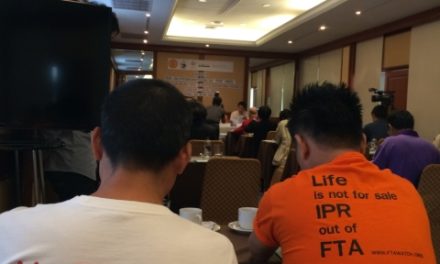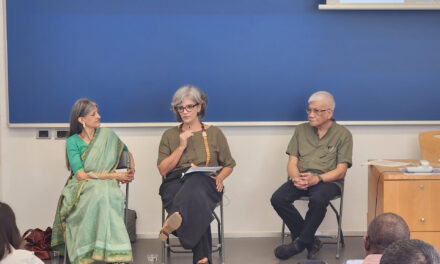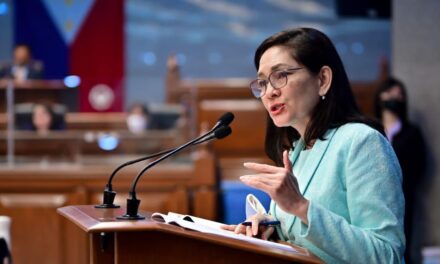Ten Years is Enough!
Pascal Lamy’s draft text released for the upcoming Ministerial Meeting of the World Trade Organization (WTO), if agreed in Hong Kong, will destroy the livelihoods of peasants, small farmers, landless and indigenous peoples, fisherfolk and workers the world over.
Where is the promise of development?
The current round of talks is called the Doha Development Round but the draft Ministerial text makes it clear that there is nothing developmental about this round. The text focuses on opening up developing country markets and sidelines the main demand of developing countries for special and differential treatment (S&D).
Where is the promise of development?
The current round of talks is called the Doha Development Round but the draft Ministerial text makes it clear that there is nothing developmental about this round. The text focuses on opening up developing country markets and sidelines the main demand of developing countries for special and differential treatment (S&D).
The so-called “development package” that Lamy is offering to least-developed countries (LDCs) is little more than a public relations stunt. While stating they will live up to promises made to LDCs on development, the text waters down the S&D provisions and resurrects other valueless provisions which were rejected 2 years ago in Cancun. Lamy tries to cover this up with the offer of ‘Aid for Trade’. This is a ploy to confuse and weaken the resistance of developing countries as the program only goes towards building the capacity of developing countries to implement agreements that they were forced to accept in the first place.
“No one is fooled by Lamy’s attempt to pass this off as a development package. Ten years of broken promises and now this…. Nothing more than an empty and miserly package,” said Mary Lou Malig of Focus on the Global South.
Development for Agri-business not for small farmers
The text on Agriculture reflects the positions of exporting countries and the interests of their agri-business. Despite long standing demands to cut their direct and indirect export subsidies, the tabled proposals are “paper-cuts” that do not change the status quo in favour of developing countries. Instead, what the EU and the US have done is reinforce the imbalance by expanding the Blue Box, which will allow an additional US $5billion of farm support for the US and the maintenance of the undisciplined Green Box which the European Commission will use for its other subsidies.
The text also does not give any date for an end to export subsidies. Such subsidies, which are largely provided to the biggest producers and their agri-business as opposed to family farm based agriculture, will be allowed to continue unabated.
In return for this, developing countries are expected to fully open their markets through drastic tariff reduction and to cut their remaining, if any, domestic supports. It is impossible to see how this Agreement, which threatens to wipe out peasants and small farmers, can be classified as constituting a ‘development round’.
As Henry Saragih of La Via Campesina, an international peasants and small farmers movement said, “This text will continue and worsen dumping. It will destroy peasants and small farmers livelihoods all over the world. La Via Campesina and other movements have launched their demand “’People’s Food Sovereignty Now!’”
Deindustrialization and loss of livelihoods
The Non-Agricultural Market Access text has been strongly criticized for its bias towards developed countries as it completely glosses over the wide opposition from least developed and developing countries to the proposals.
The text is a threat to developing countries as the draconian formulas proposed threaten to wipe out their industries and remove any future policy space to determine their own development priorities. Proposals put forward by Caribbean and African delegates have been ignored or sidelined in the draft Ministerial text.
As Daniel Canada of Kilusang Mangingisda and Southeast Asia Fisheries Trade for Justice network states, “The NAMA prescription of blanket trade liberalization, contrary to the aims set forth in the Doha Ministerial, is a disastrous recipe for food insecurity and the loss of livelihoods of small scale, artisanal fishers and communities.”
The take-over of services
Of all the proposals, however, the services text proves to be the greatest threat of all. It not only glosses over the opposition to this text, it has completely ignored any of the developing countries strong refusals to it. If endorsed, negotiations in services will be intensified along the path of the “plurilateral approach” which subverts the original flexibilities of the General Agreement on Trade in Services (GATS). Countries will no longer be able to choose which sectors and how fast they will be liberalized but rather they will be all but forced to enter into sectoral negotiations and give foreign companies equal rights to local suppliers.
“This will be a take-over by transnational corporations of our services, severely limiting access to it to those who can afford it” states Rex Varona of Asian Migrant Center.
Movements unite in opposition
Movements are one in voicing their opposition to this threat to the world’s peoples and are intensifying their struggle in order to prevent this deal from going through in the coming WTO Ministerial in Hong Kong this December.
“The Ministerial text is not representative of all Members countries of the WTO. We can see that the organization is once again in internal crisis. We are demanding an end to the WTO!” said Revitriyoso Husodo from the Institute of Global Justice.
“Movements from all over the world will be coming here to Hong Kong, and flooding the capitals of their own countries, to ensure that there is no deal in Hong Kong,” said Kwok Kam Lam of the HKCTU.
For more information or to arrange an interview with any of the panelists, please call Nurul Qoiriah 61533105 or Brett Solomon 6497 2675.









